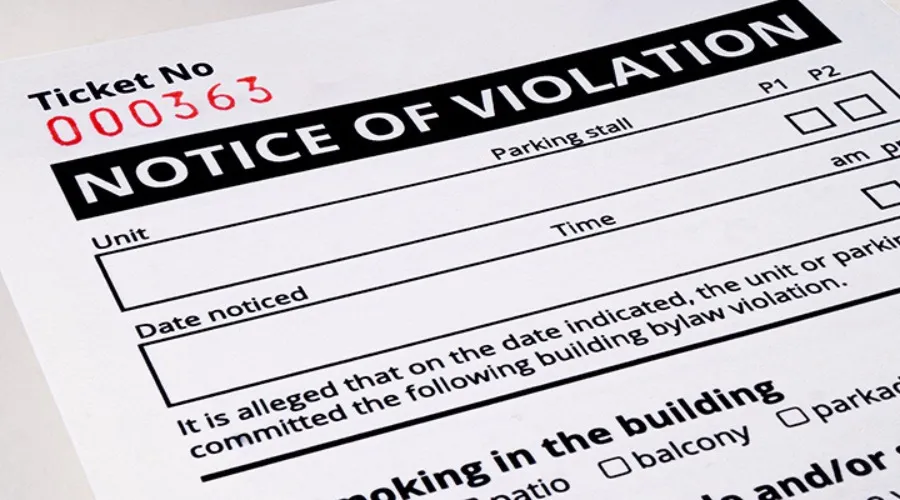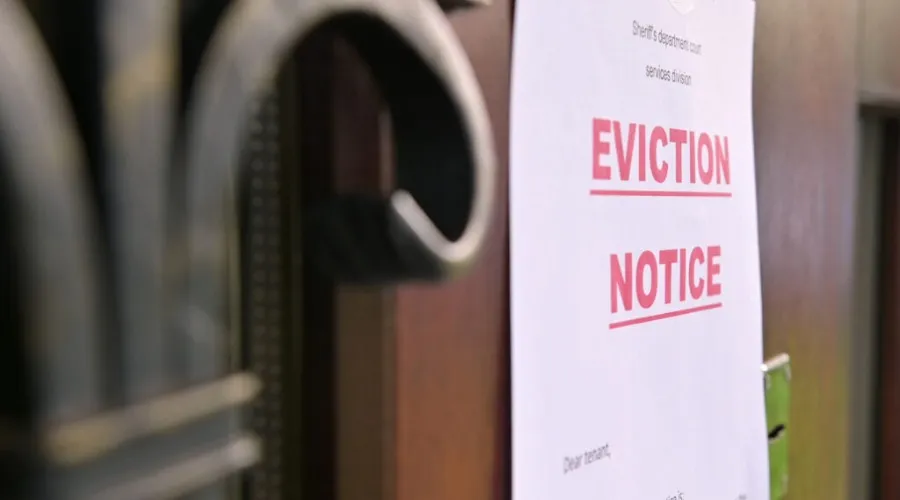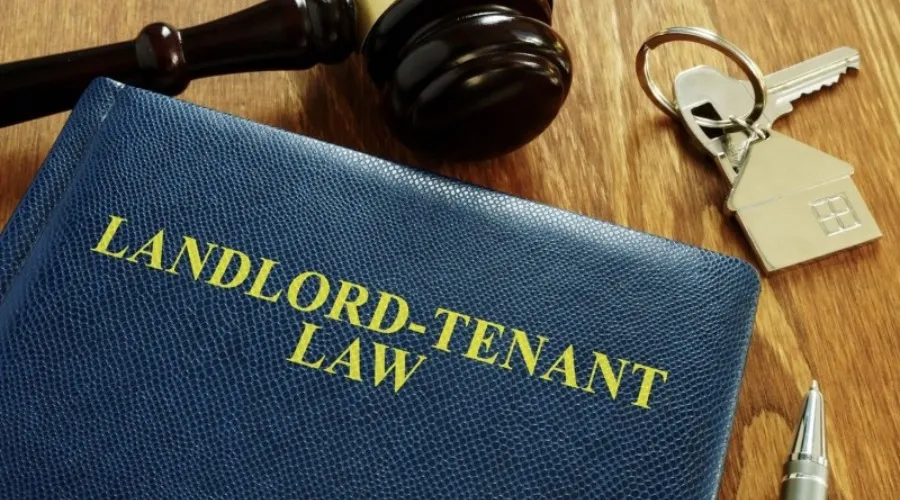The eviction process in Missouri, governed by Missouri Revised Statutes (Chapters 441 and 535), requires landlords to follow strict legal steps, from serving proper notices to obtaining court approval, to ensure compliance and avoid costly errors. Read on to explore each phase in detail and learn how tools like LeaseRunner can support compliance and help screen tenants more effectively.
Valid Reasons for Eviction in Missouri
In Missouri, tenants may be evicted for failing to pay rent, violating lease terms, engaging in illegal activity, or staying past the lease expiration. Below are the most common legal reasons for eviction:
1. Failure to Pay Rent
The most common eviction cause in Missouri is failing to pay rent on time. Rent is officially considered late just one day past its due date, although landlords and tenants can include a grace period in their lease agreement.
There’s no required wait time before a landlord can act. Legally, they can file for eviction the moment rent is overdue - even if it’s just by a dollar. Still, most legal experts suggest waiting about 14 days before proceeding.
Unlike other states, Missouri landlords don’t need to provide a written notice before filing for eviction due to unpaid rent. If no rent has been paid for a month, the landlord is within their rights to begin the eviction process.
2. Lease Violations
Any violation of the lease can lead to eviction. The lease outlines the roles and responsibilities of both landlord and tenant. Common violations include:
- Causing property damage
- Smoking in restricted areas
- Exceeding occupancy limits
- Keeping unauthorized pets
When a lease is breached, the landlord must issue a 10-Day Notice to Quit, giving the tenant time to move out. While landlords can offer the chance to fix the issue, Missouri law doesn’t require it. If the tenant remains after 10 days, the landlord can file for eviction under what’s known as an unlawful detainer case.

Read more: Rules and Regulations in Missouri Rental
3. Illegal activity on premises
Tenants involved in illegal activities can be evicted with a 10-Day Notice to Quit. Examples include:
- Prostitution
- Illegal gambling
- Drug manufacturing or distribution
For severe cases, such as violence, drug trafficking, or major property damage, landlords may skip the notice altogether and file for eviction immediately. If a guest or co-tenant commits the offense (not the leaseholder), a 5-day notice must be provided before filing.
4. Non-Renewal or Holdover Tenant
Missouri landlords can't evict without cause during the lease term. However, once a lease ends, and the tenant doesn’t move or renew, they become a holdover tenant.
At this point, the landlord may issue a 30- or 60-day Notice to Quit, depending on the type of tenancy (monthly, weekly, etc.). If the tenant stays beyond this period, the landlord may file an unlawful detainer suit. For more details on ending lease agreements legally, see our guide to breaking a lease in Missouri.
5. Squatter or Unlawful Detainer Issues
People staying in a property without the owner’s permission—commonly referred to as squatters—can be removed through an unlawful detainer action. This legal process helps landlords reclaim possession when a property is occupied without a lease or legal right. To understand how Missouri handles these cases, visit Missouri Squatter Rights for more legal context and guidance.
Serving an Eviction Notice in Missouri
Serving an eviction notice in Missouri initiates the legal process to remove a tenant, governed by Missouri Revised Statutes (Chapters 441 and 535). Below, we outline key aspects to ensure compliance and accuracy.
Types of Notices
Eviction notices vary by tenancy type and violation. Here are the main types used in Missouri:
- Notice to Quit for Non-Payment: No specific notice period required; a demand for rent is made the day after it’s due (Mo. Rev. Stat. § 535.060). Common practice includes a 3- to 5-day grace period to pay or vacate.
- 10-Day Notice to Comply or Quit: For lease violations (e.g., unauthorized pets), tenants get 10 days to correct or leave. Severe violations (e.g., illegal activity) may warrant a 10-day unconditional notice.
- 30-Day Notice to Quit: Terminates month-to-month tenancies with 30 days’ notice, aligned with the rental period’s end (Mo. Rev. Stat. § 441.060).
- 60-Day Notice to Quit: Required for year-to-year tenancies, giving 60 days to vacate without cause.
- 5-Day Notice to Quit: Used for illegal acts by a tenant’s guest (e.g., drug activity), requiring action or eviction (Mo. Rev. Stat. § 441.740).
Notice Content Requirements
To be legally enforceable, every eviction notice in Missouri must clearly state:
- The tenant’s full name and the property address.
- Specific reason for the eviction (e.g., unpaid rent, lease breach).
- Exact deadline to pay, comply, or vacate.
- Landlord’s name, signature, and contact info.
- A legal warning about potential eviction if the tenant fails to comply.
- Proof of service (how and when the notice was delivered).
Approved Methods to Serve Notice
Missouri allows multiple methods to serve notices, each with advantages and drawbacks. Approved methods include:
- Hand Delivery: Direct to tenant or occupant (15+). Pros: Immediate proof. Cons: Confrontational, tenant avoidance.
- Posting: On the property if the tenant is absent. Pros: Simple. Cons: Notice may be missed.
- Certified Mail: Sent with return receipt. Pros: Documented. Cons: Delays, refusal to sign.

Find out: Obligations and Duties of Landlord and Tenant in Missouri
Legal Errors to Consider
Even small mistakes in the eviction process can delay your case—or worse, get it thrown out entirely.
Common missteps include serving the wrong type of notice or delivering it with incorrect timing, omitting key details like dates or reasons for eviction, and using invalid service methods such as regular mail.
Landlords should also avoid illegal “self-help” tactics like changing locks, retaliating against tenants who file complaints, or accepting rent after issuing a notice—actions that could undermine or cancel the eviction altogether.
Step-by-Step Eviction Process in Missouri
Step 1 – Serve Proper Eviction Notice
Landlord serves the appropriate notice (e.g., Demand for Rent, 10-Day Cure or Quit, 30/60-Day Notice) based on the eviction reason, following Missouri statutes. Proper service (hand delivery, posting, or certified mail) and accurate content are critical to avoid dismissal.
Step 2 – File Unlawful Detainer in Circuit Court
After the notice period ends, landlords in Missouri must file an eviction lawsuit at the circuit court where the rental property is located. This legal action should only begin once the proper notice to comply has been served and the tenant fails to respond.
How to file for eviction? 3 key steps include:
- Visit the correct county’s circuit court.
- Complete and submit the required eviction forms.
- Pay the court filing fees.
Accuracy matters - incorrect paperwork can delay the case or lead to dismissal.
Eviction Timeline: On average, it takes 30 to 60 days to proceed with an eviction.
Issuing the Notice to Comply
Before going to court, you must give the tenant a notice to comply. Templates are available online (PDF or Word), or you can use a guided eviction notice tool to generate the correct document. Though the wizard may charge a small fee, it ensures you're legally protected and compliant from the start, saving you from costly mistakes in court.
Step 3 – Serve Summons and Complaint
Once an eviction case is filed, the next step is delivering the Summons and Complaint to the tenant. Missouri law does not allow landlords to serve these documents themselves.
The Summons notifies the tenant of the court date and instructs them to appear. These documents must include key details like the time, date, and location of the hearing.
Only the county sheriff or a court-authorized process server is permitted to serve the paperwork. They must complete the delivery at least four days before the scheduled court date.
Legal Methods to Serve Tenants
- Personal Service: Delivered directly to the tenant. Must be completed at least four days before the court hearing.
- Substituted Service: If the tenant isn’t home, documents may be handed to someone age 15+ living at the property.
- Posting and Mailing Service: Papers are securely posted at the rental unit’s entrance and also mailed to the tenant’s address. Must be completed at least 10 days before the court hearing.
Before using posting or mailing, the server must try at least once to deliver the documents in person. Landlords must also request these alternative methods if needed.
What happens after service? Tenants do not have to file a written response. Their only obligation is to attend the court hearing.
Note: Service must be completed no later than four days before the court date.
Step 4 – Tenant Response Period
Tenants typically have 7-14 days to respond to the summons, depending on court rules. They may file an answer, counterclaim (e.g., for habitability issues), or request a continuance. If no response is filed, the landlord may request a default judgment.
Step 5 – Court Hearing
Once the court receives the landlord’s filing and the tenant is properly served, a hearing is typically scheduled within 15 to 21 days, depending on the reason for eviction.

During the hearing, two possible scenarios can unfold:
- If the tenant fails to file an answer or skips the hearing, the landlord can request a default judgment for possession. This means the court may award the landlord both monetary damages and legal possession of the property—also known as the Writ of Possession (issued in Step 6).
- If the tenant files an answer or appears in court, both sides will present evidence for the judge to decide whether possession or compensation is warranted. The landlord should bring:
- A signed lease agreement
- Proof of ownership (e.g., deed)
- Rent ledger or bank records
- Notices, witness statements, and photo/video evidence of violations
Note: Filing an answer does not delay the hearing—proceedings continue as scheduled.
After the hearing, if the court rules in favor of the landlord, the tenant has 10 days to file an appeal or request a new trial. If no action is taken within that period, the judgment becomes final and enforceable. The landlord can then proceed to obtain the Writ of Possession to reclaim the rental property.
Read more: Missouri Security Deposit Laws: Rights, Regulations, and Responsibilities
Step 6 – Obtain Writ of Possession
Court Issues Writ of Possession
Once the landlord wins the eviction lawsuit and no appeal is filed by the tenant, the court issues a Writ of Possession after 10 days. This legal document notifies the tenant that they must vacate the rental unit. If they fail to leave voluntarily, law enforcement may carry out a forced eviction.
Enforcing the Move-Out Order
From the moment the Writ is delivered to law enforcement, tenants typically have 24 hours to 5 days to vacate, depending on the timing and case type. Left-behind property must be handled according to local possession laws.
To begin the tenant removal process, the Writ must be handed over to local law enforcement within two business days of the court ruling. Once received:
- If the eviction involves illegal activity, officers must act within 24 hours.
- For other cases, like nonpayment of rent, enforcement must occur within 15 days.
In total, tenants may have as little as three days to leave, depending on when the Writ is processed. However, landlords cannot forcibly remove tenants themselves. Only authorized personnel can carry out the eviction.
Handling Left-Behind Property
If tenants leave behind personal items, landlords must store them for at least 10 days. A written notice should be sent to the tenant’s last known address, requesting them to retrieve their belongings.
If the tenant does not respond within the 10-day window, the landlord can legally dispose of the items.
Step 7 – Sheriff Enforces and Landlord Regains Possession
The sheriff schedules and executes the eviction, giving the tenant a final notice (usually 24-48 hours) to vacate. If the tenant doesn’t leave, the sheriff removes them and their belongings. The landlord regains possession and may change locks.
Eviction Timeline and Cost in Missouri (2025)
In Missouri, evictions must follow a legal process outlined in Chapters 441 and 535 of the Missouri Revised Statutes. Below is a simplified 2025 eviction timeline, including steps, timeframes, and estimated costs. These may vary by location or case complexity.
Documentation and Evidence Requirements
When facing an eviction dispute, presenting strong, organized evidence is crucial. Whether the issue involves unpaid rent or lease violations, courts rely on clear documentation to decide in favor of either the landlord or the tenant.
1. Best Record-Keeping Practices
If a tenant contests the eviction in court, clear and organized documentation can significantly impact the outcome in your favor. To stay prepared:
- Paper Records: Useful but risky. Paper trails are bulky, easy to misplace, or damage.
- Digital Scanning: Use a scanner (e.g., Brother ADS-1700W or Fujitsu ScanSnap iX1500) to digitize all property-related documents.
- Cloud Backup: Store files in Google Drive, Dropbox, or OneDrive for quick access and security.
- Property Management Software (PMS): The best solution. PMS systems keep track of lease agreements, rent receipts, maintenance logs, photos, emails, and more - all in one place.

2. Evidence of Nonpayment
When tenants deny missing rent payments, you’ll need solid proof to support your claim:
- Lease Agreement: Show terms regarding rent due dates and late fees.
- Payment Records: Include receipts or bank statements to show a consistent history of rent payments, or lack thereof.
- Returned Payments: Provide documentation of bounced checks, insufficient funds notices, or credit card disputes, including related fees.
- Communication Logs: Share copies of emails, texts, or letters where payment reminders were sent, especially those giving time to cure the default.
3. Lease Violation Evidence
To legally support an eviction based on lease breaches like property damage, noise, or unauthorized pets:
- Surveillance Footage: Camera recordings showing the violation can be crucial.
- Videos & Photos: Use your phone to document damages or disturbances.
- Lease Terms: Highlight the specific clause violated. Even if not all rules are written, severe violations can still support eviction.
- Incident Reports: Add reports from neighbors, property managers, or police when applicable.
4. Property Condition Reports
To strengthen your case in an eviction or deposit dispute, it’s crucial to document the property’s condition before, during, and after the tenancy.
Start with a detailed move-in and move-out inspection using checklists signed by both parties to clearly show any changes. Supplement these with timestamped photos or videos—judges often favor visual evidence when assessing damage claims. Keep copies of repair invoices or professional estimates that link directly to tenant-caused issues.
Lastly, maintain a log of maintenance requests and your responses; this demonstrates that you addressed problems promptly and helps protect against false claims of uninhabitable conditions.

Common Landlord Mistakes in Missouri Evictions
Landlords in Missouri must carefully follow the eviction process to stay in compliance with Missouri Revised Statutes (Chapters 441 and 535). Mistakes can cause case dismissals, delays, or legal issues. Here are common mistakes to avoid.
Self-eviction (changing locks, removing belongings)
Attempting self-help evictions, such as changing locks, shutting off utilities, or removing tenant belongings without a court order, is illegal in Missouri (Mo. Rev. Stat. § 441.233). Only a sheriff can execute an eviction after a court-issued Writ of Possession.
Improper notice or service
Issuing the wrong notice type (e.g., using a 10-day notice for non-payment instead of a demand for rent), providing insufficient notice periods (e.g., less than 30 days for month-to-month tenancy), or failing to serve via approved methods (hand delivery, posting, or certified mail) can invalidate the process (Mo. Rev. Stat. § 441.060, § 535.060).
Ignoring tenant protections
Evicting tenants for discriminatory reasons (e.g., race, religion, disability) violates the Fair Housing Act and the Missouri Human Rights Act. Evicting in retaliation for tenants exercising rights (e.g., reporting habitability issues or withholding rent for uninhabitable conditions) is also prohibited (Mo. Rev. Stat. § 441.020).
Legal Resources for Missouri Landlords
Understanding Missouri eviction laws is essential for landlords to avoid legal missteps. Here's a simplified guide to key legal tools and services that support landlords through the eviction process and broader rental compliance.
State Statutes and Legal References
Evictions in Missouri are governed by Chapters 441 and 535 of the Missouri Revised Statutes. These laws define when and how landlords can issue eviction notices, file for unlawful detainer, and enforce lease terms. Local ordinances - especially in cities like St. Louis or Kansas City - may include additional rules, so landlords should always check municipal codes alongside state law.

Free Legal Aid for Landlords
Nonprofit organizations such as Legal Services of Missouri provide free legal assistance to eligible landlords dealing with tenant disputes or evictions. In addition, local bar associations often offer pro bono programs connecting landlords with volunteer attorneys for consultations. Some Missouri law schools also operate legal clinics that assist with basic landlord-tenant legal issues.
Court Filing Help and Forms
The Missouri Courts website offers downloadable eviction forms, including the Petition for Rent and Possession and Unlawful Detainer Complaint. For in-person support, landlords can contact the Circuit Court Clerk’s office in the county where the rental property is located. They can provide guidance on how to file documents and meet court requirements.
Eviction Screening Services
Reducing eviction risks starts with effective tenant screening. Our service at LeaseRunner offers a full eviction history check to help landlords identify reliable applicants. We also provide credit checks, background reports, and rental payment history to support smart leasing decisions.
Final Thoughts
The eviction process in Missouri can be complicated, stressful, and time-intensive. That’s why many landlords choose to work with professionals. LeaseRunner offers expert guidance on Missouri tenant laws and can help you handle evictions efficiently and affordably. Whether you're dealing with a difficult tenant or navigating Missouri security deposit laws, LeaseRunner is here to support your rental decisions with clarity and compliance.
FAQs
1. Do landlords need a lawyer to evict a tenant in Missouri?
No, landlords can self-represent using Missouri Courts forms, but a lawyer ($500–$2,000+) is advisable for complex cases like subsidized housing or tenant defenses.
2. Can a tenant fight an eviction in Missouri?
Yes, tenants can fight evictions by raising defenses (e.g., improper notice, retaliation, discrimination) within 7–14 days of receiving a summons (Mo. Rev. Stat. § 534.050), potentially delaying or dismissing the case.
3. Is court approval required for all evictions in Missouri?
Yes, court approval via a judgment and Writ of Possession is required for all evictions, unless the tenant vacates voluntarily after a valid notice (Mo. Rev. Stat. § 441.233). Self-help evictions are illegal.



